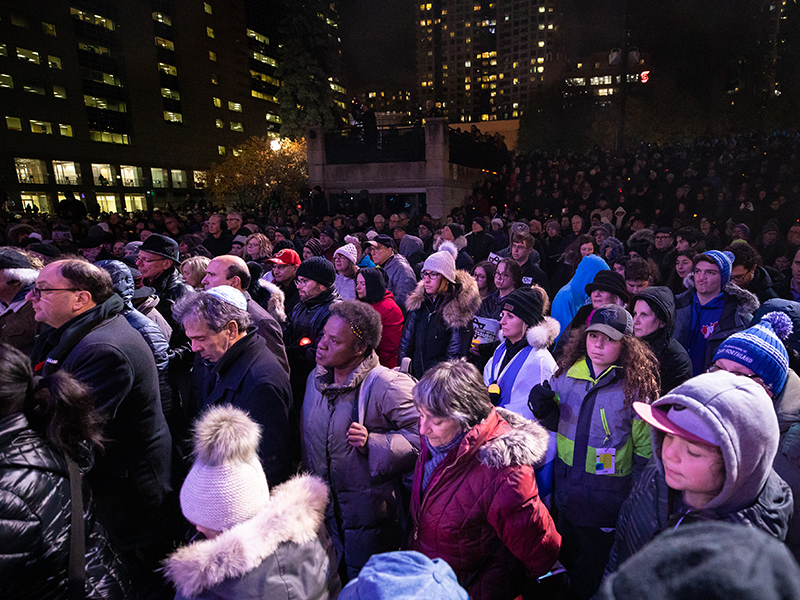The thing about the Pittsburgh shooting is that it is something that could happen anywhere at any time – but we never anticipate it because we cannot possibly imagine that such a thing would ever happen to us. Yet the reality is that we live in a dangerous world today and we are responsible as a community to be taking the appropriate steps to enhance our security. This past July, as a family we spent the Shabbat services at the New West End shul on St. Petersburgh Place in central London where the rabbi and a volunteer member of the congregation ran an emergency drill.
There is no description that can fully express such an act of senseless nature, because a description would in itself be an attempt to find a rationalization which simply cannot exist in the context of what happened in Pittsburgh. Anti-Semitism is alive and well. It is a disease that runs deep from the earliest of times. There have been great armies and single pathological crazies who have been determined to annihilate the Jewish people, but they will never succeed because we have something much bigger than ourselves as individuals – we are single voices making up a community. As long as there is a minyan to congregate, we will have a community that will look out for each other. Our Jewish community is the strength that protects the continuity of a people whose spirit and moral character will not be broken. Every person should be able to attend their place of worship without fear.
The recent popularity of the terminology “words matter” has become mainstream jargon. The simplicity and silence of these words speak a universal truth. The movement of #WordsMatter has far reaching implications and my mention of this term is not in any way an insight into any political bias, but rather I am interested in their characterization of what I believe to be a moral responsibility.
This responsibility to our verbal characterizations is emphasized in the many liturgical and rabbinical references with the most important caution to guarding our tongue. There is a powerful lesson here that underlines the severity of impact that words can have. There is a direct responsibility to the extreme polarization of rhetoric that can give license to the fringe and act as a trigger. We must take heed and be conscious of the power of our words, said in jest, said in anger, said in frustration, and said in the pursuit of a persuasive argument.
READ: REFLECTIONS ON THE PITTSBURGH SHOOTING BY A UNIVERSITY OF TORONTO STUDENT
Last week, a disturbed and volatile person murdered innocent people whose only crime was being Jewish. At some point there was a pivot in his perverse rational that gave him a licence to act. He is not the first and will likely not be the last. But what he is, for sure, is a reminder to us on so many levels that there are people who will use almost any excuse to make others a scapegoat in pacifying their own feelings of inferiority and failure. Hate is and will always be a detraction of the real truth behind a person’s inadequacy and jealousy. There is a very fine line to be straddled when we speak the words we use to express ourselves. Our words are a gift from God and along with the ability to make conscious choices we are different from animals. As a community we should draw the line with the influencers, be them journalists, politicians across the spectrum, and virtually anyone with access to the ears of the listening public and remind them of their responsibility to use their words wisely.
“And Avraham breathed his last and died at a good age, old and satisfied, and his soul was gathered to his people” (Breishit 25:8) Each one of those murdered in Pittsburgh last week in the pews of their shul deserved to come to an equally peaceful end.
For more in our #SolidarityShabbat series, please click here
